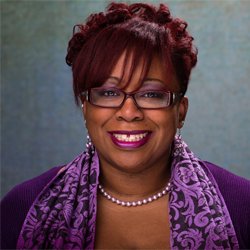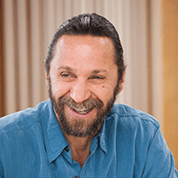Clinical Mental Health Counseling
Explore Counseling in a Hybrid Format
Union Institute & University’s Master of Arts in Clinical Mental Health Counseling prepares you for certification or licensure as a professional counselor or clinical mental health counselor. Our CACREP accredited program will also equip you for future doctoral studies in counseling and related fields – without sacrificing your job or your income. Our flexible, online master’s degree program offers supervised practicum and internship experiences as required by state and national agencies and credentialing bodies.
Thrive in a Competitive Marketplace
Union Institute & University’s Master of Arts in Clinical Mental Health Counseling prepares you for certification or licensure as a professional counselor or clinical mental health counselor. Our CACREP accredited program will also equip you for future doctoral studies in counseling and related fields – without sacrificing your job or your income. Our flexible, online Master of Arts degree program offers supervised practicum and internship experiences as required by state and national agencies and credentialing bodies.
A unique hybrid learning format
Union’s Clinical Mental Health Counseling program features online learning for courses combined with face-to-face residency experiences twice each calendar year at our Cincinnati, Ohio academic center. By attending these biannual residencies, you will get a chance to interact with your professors and colleagues in-person.
UPDATE: Due to COVID-19, our residencies are currently being held virtually.

Dr. Rosalyn Y. Brown Beatty, LPC, NCC
CMHC Program Director
What makes Union’s M.A. in Clinical Mental Health Counseling program unique?
We create a connected environment where students have real relationships with faculty, peers and mentors in the counseling field. You will never feel like a student number but have a place where you belong, are encouraged, and create long lasting professional relationships. Our mission is to support every student as a professional colleague in gaining counseling concepts and skills, but also encourage reflective personal growth as you embark on the journey of wanting to help others.

Our CACREP accredited program is led by scholar-practitioners who are leaders within the counseling education field, while active in counseling private practice, schools and mental health agencies. Our Counselor Educators, pride themselves on being able to teach the theories, techniques, and skills required to become a counselor, using decades of combined counseling experience to adequately prepare students to become advanced practitioners in the field of counseling and building connection to the broader counseling professional network.
Clinical Mental Health Counseling Structure & Courses
• 60 credit hour program
• Full-time & part-time options
• January, May, and August start dates
• Residencies held twice a year
Meet Our Clinical Mental Health Counseling Faculty
Frequently Asked Questions
What are the admissions criteria?
Admission is open to applicants who hold a bachelor’s degree from a regionally accredited institution or a recognized international institution of higher education. The admission decision is based upon the following: (1) a cumulative GPA of 3.0, (2) official transcripts from all previous institutions, (3) completed online application and personal statement detailing personal and professional goals, (4) resume or curriculum vitae, (5) 3 professional references, including one from a person qualified to evaluate your potential for clinical work, (6) English proficiency (if applicable), and (7) individual interview.
How much will the program cost me? Are there financial aid or scholarship funds available?
For a list of current tuition and fees, click here. There are a number of federal and state student aid programs available to qualified students. A financial aid counselor can assist you with questions related to your specific circumstances. Additionally, click here for information about scholarship opportunities to help you meet tuition costs.
What are my responsibilities as a student when it comes to preparing for licensing/certification?
If you have not done so already, secure a copy of your state’s credentialing requirements and compare it to the coursework and internship guidelines defined in the major in Clinical Mental Health Counseling University Catalog. If your state’s requirements differ from the course sequence checklist outlined in the university catalog, your studies can often be realigned to achieve your desired outcome. All students are required to take the Counselor Preparation Comprehensive Examination (CPCE) in their final term. The exam stimulates student integration of knowledge learned throughout the curriculum and gives comparative feedback on areas of strength and weakness.
When can I start the program and when will I graduate?
Start dates occur each year in January, May, and August. The hybrid delivery model in the Clinical Mental Health Counseling program offers students a blended online and residency-based academic experience. Students will attend three, three-day weekend residencies annually, along with full-featured online course delivery. Residencies are held at the Cincinnati, Ohio Academic Center. Students may complete this 60-credit program in 6 consecutive terms, or 2 years. In the past three years, our program has graduated an average of 14 students each year from around the country.
What kind of job will I qualify for after I graduate with a master’s degree in counseling?
Our program prepares students for state licensure or national certification. Graduates will qualify for supervised positions providing mental health services to individuals, groups and organizations in a variety of settings while completing the post-graduate clinical hours required for licensure in their state or certification at the national level.
Licensure & certification details
While no program can guarantee licensure or certification to any individual, numerous external regulatory and state credentialing/licensing requirements for professional counselors were used in the design of the M.A. in Clinical Mental Health Counseling program. These include academic course requirements shared by states and stipulations made by national credentialing bodies for specific types of national certification. Prospective clinical mental health counseling students should review their state’s licensing requirements before matriculating into licensure-bound studies at Union Institute & University.
The M.A. in Clinical Mental Health Counseling program has been awarded accreditation by the Council for Accreditation of Counseling and Related Educational Programs (CACREP) . This accreditation is a testament to the strength of our graduate program, and the desire to provide the highest quality experience and instruction to our students. CACREP accredits master’s and doctoral degree programs in counseling and its specialties that are offered by colleges and universities in the United States and throughout the world.
Please note: Completion of the M.A. in Clinical Mental Health Counseling degree does not automatically qualify you for certification or licensure in your state. Consult the appropriate state or national regulatory agency regarding licensure or certification requirements and processes for application. The ultimate responsibility regarding licensure or certification remains with the individual student and not with the institution.
What are the program completion rates?
During the 2016-2017 academic year, 10 students completed their Master of Arts in Clinical Mental Health Counseling. The pass rates for students who took the NCE and/or NCMHCE credentialing exams, is 100% (7 students have taken the exam). Of those graduating students, 100% completed their degrees in the expected completion time period as discussed in the graduate handbook. Job placement rates immediately after graduation is at 90%. Alumni have secured counseling positions in counseling agencies, schools, and counseling private practices. Additionally 2 alumni from the 2016-2017 graduating class have begun to apply for doctoral programs in Counselor Education & Supervision.
Where can I find information on the summary of program evaluation results, program modifications and substantial program changes?
The program annually compiles a report on the systematic program evaluation to ensure students are trained competently and ethically for preparation as professional counselors. This information is posted yearly in November on our website so that students currently in the program, program faculty, institutional administrators, and personnel in cooperating agencies (e.g., employers, site supervisors) may review it. An email is sent at time of publication so that all interested parties know when the report is available.
Click below to view the current annual report.
Licensure Disclosure
A state license in counseling is literally permission from a particular state to practice counseling or to call oneself a licensed counselor. Some states have a single license and some have a two-tiered system. The names of state licenses vary from state to state. Some examples are LPC, LCPC, LPCC, LMHC, LPCMH, LCMHC, LPC-MH. Though requirements for licensure vary from state to state, all require some combination of: a master’s degree; counseling experience and supervision; and a passing score on the NCE and/or NCMHCE. Some require a mental health jurisprudence exam of that state.
Note: Completion of the MA-CMHC degree does not automatically qualify students for certification or licensure in their respective states. Students should consult the appropriate state or national regulatory agency regarding licensure or certification requirements and processes for application. The ultimate responsibility regarding licensure or certification remains with the individual student and not with the institution. (2020-2021 Catalog, July 1, 2020)
For additional information, including a breakdown by state, click here.








